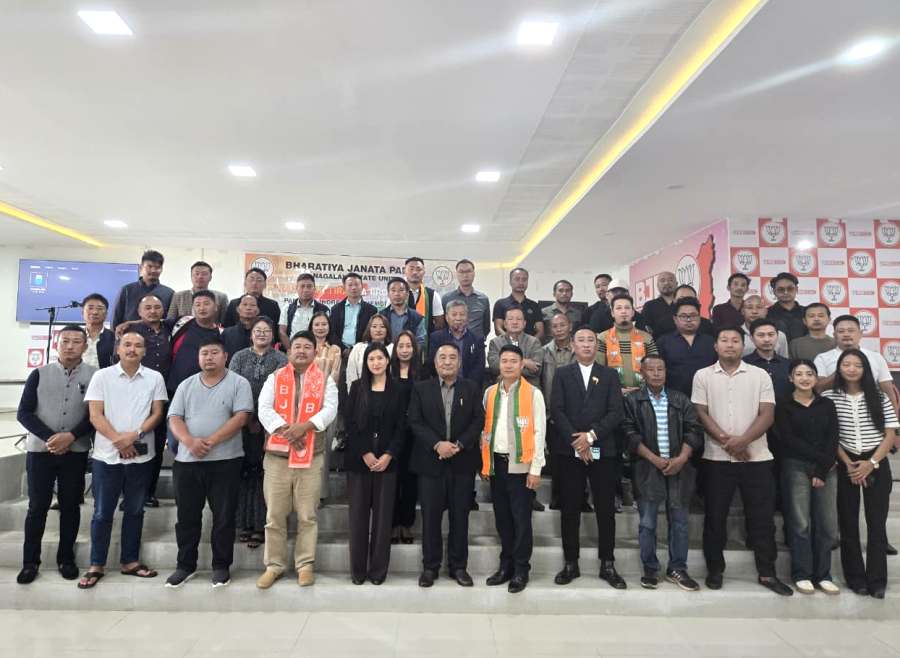Bharatiya Janata Party and Nagaland University marked Partition Horrors Remembrance Day in Kohima, paying tribute to the resilience and unity of millions affected by the 1947 partition.
Published on Aug 14, 2025
By EMN
Share

DIMAPUR — Partition Horrors Remembrance Day was observed at the Bharatiya Janata Party (BJP) Head Office in Kohima and at Nagaland University on Thursday, with tributes paid to the millions who endured immense suffering during the partition.
At the BJP Head Office, Advisor for Prisons and Printing and Stationery, Kropol Vitsu, speaking on the occasion, said this day stands not only as a reminder of a painful past but also as a call to unity, peace, and human empowerment, stated a press release.
He said that remembrance of Partition Horrors Remembrance Day is a moment of reflection for every Indian — not to reopen wounds, but to recognise the strength and resilience of the people and to ensure that the tragedy of the past paves the path towards peace and progress.
Stating that the 1947 partition, while driven by the momentum of political decision-making, was resisted strongly by leaders like Mahatma Gandhi, who stood firmly against the idea of division, he added that despite his efforts, the tide of events led to the separation of the subcontinent — and with it came one of the largest and most violent mass displacements in human history.
Also read: Naga political groups, students observe Naga Independence Day
He stated that the displacement of millions of people across newly drawn borders had also resulted in the death of nearly a million innocent lives due to communal violence. Reflecting on the tragedy, he remarked that it had been survival of the fittest in its cruellest form, where humanity suffered at the hands of division, yet from this immense suffering emerged courage, sacrifice, and the determination to rebuild a nation.
Vitsu emphasised that the India known today is the product of the relentless efforts of visionary leaders and citizens who, despite the trauma, worked together to stabilise and strengthen the country.
He also acknowledged that while peace largely prevails, occasional incidents, such as the one in Pahalgam, serve as reminders of the continuing relevance of this remembrance, namely the partition of 1947.
At Nagaland University, in the inaugural programme, Dr. Suraj Beri, assistant professor, Department of Sociology, spoke to the audience about the horrors of partition as the consequence of the Westphalian idea of the nation-state being imposed on them.
Dr. Shasanka Sekhar Pati, associate professor, Department of Political Science, traced the destruction and horrors left by the British throughout history — felt across the world, from Gaza to India — by an empire on which the sun never set.
He emphasised the importance of the day, the need for unity in diversity, and the foundation of action through which the future should be shaped by cooperation and understanding.
Read more: NSCN (IM) reaffirms Naga unity, freedom at 79th Independence Day
A documentary titled ‘1947: Children of Partition’ was screened during the programme.
Focusing on the idea of ‘Bharatiyata’, the Vice-Chancellor Prof. JK Patnaik, in his address, stated that partition was a deliberate project by the British to diminish the historical greatness of the subcontinent.
He stated that the division which created the “Hindu versus Muslim” narrative had never been part of ‘Bharatiyata’ but had been meticulously promoted by the British. He added that it was an attempt to systematically erase the idea of ‘Bharatiyata’ from the minds and souls of the people.
Prof. MK Sinha, Department of Economics, discussed the macro-level economic burden that India had to face due to Partition. From the most fertile lands going to Pakistan to declining productivity and industrial stagnation due to labour shortages, India’s GDP per capita fell from USD 1,058 in 1945 to USD 619 in 1949.
Dr. E Benrithung Patton, associate professor, Department of Political Science, Fazl Ali College, another panellist, focused on the social impact of the border-making process under the Radcliffe Line.
Dr. Likhase Sangtam, associate professor, Department of Political Science, observed that the wound of the Nagas lay in the unresolved political question of self-determination, with the trauma stemming not directly from partition but from the neglect of their identity.
He stressed that true remembrance must address all wounds — including those of Nagaland — and that unity must never come at the cost of diversity, adding that India must be a nation where everyone feels included, an idea reflected in the Constitution.
Dr. Sentikumla, assistant professor, Department of Law, viewed partition through the lens of the horrors faced by women. Many women were killed — often by their own communities — out of fear of dishonour. Even when rescued and restored to their families, many were rejected for having been “dishonoured” by the other community, thus suffering multi-layered subjugation.
The symposium concluded with Dr. Deepak Bhaskar, assistant professor, Department of Political Science, stating that the idea of human civilisation lies in unity, not division.